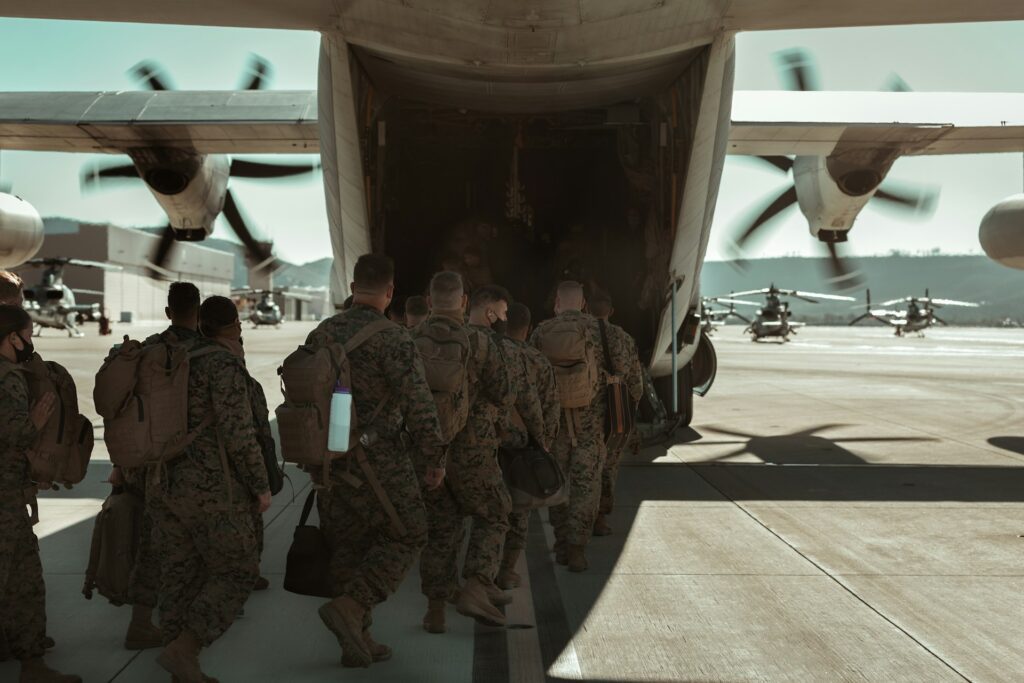 American military jobs provide a special fusion of opportunity, challenge, and purpose. Being in the military is a commitment to defending the country and promoting international peace, not just a job. From engineering and healthcare to cybersecurity and aviation, military positions cover a wide spectrum of specialities, whether in the Army, Navy, Air Force, Marine Corps, or Coast Guard. These occupations offer demanding training, useful skills, and a strong feeling of community, which makes them a desirable choice for many people looking for opportunities for both personal development and meaningful effect. Investigating military employment in the United States can provide a wealth of opportunities for those who are interested in the types of careers and the requirements for serving.
American military jobs provide a special fusion of opportunity, challenge, and purpose. Being in the military is a commitment to defending the country and promoting international peace, not just a job. From engineering and healthcare to cybersecurity and aviation, military positions cover a wide spectrum of specialities, whether in the Army, Navy, Air Force, Marine Corps, or Coast Guard. These occupations offer demanding training, useful skills, and a strong feeling of community, which makes them a desirable choice for many people looking for opportunities for both personal development and meaningful effect. Investigating military employment in the United States can provide a wealth of opportunities for those who are interested in the types of careers and the requirements for serving.
What is a Military Job?
 Military jobs entail service in one of the five branches of the U.S. Armed Forces: the Army, Air Force, Navy, Marines, and Coast Guard. Those who enlist in the military usually undergo basic training before entering a field of specialisation where they typically receive additional focused training. Those who decide to pursue a career in the military frequently advance through the ranks to take on various roles with varying degrees of leadership responsibility, and those who decide to pursue.
Military jobs entail service in one of the five branches of the U.S. Armed Forces: the Army, Air Force, Navy, Marines, and Coast Guard. Those who enlist in the military usually undergo basic training before entering a field of specialisation where they typically receive additional focused training. Those who decide to pursue a career in the military frequently advance through the ranks to take on various roles with varying degrees of leadership responsibility, and those who decide to pursue.
The military offers many people successful, fulfilling, and long-lasting professions. You might be able to discover military jobs that interest you because the military offers a wide range of career opportunities in practically every industry, across several branches. Benefits like health insurance, educational assistance, and specialised training are also possible with a military profession.
Types of Military Jobs
-
The army
The Army protects the United States’ territory, commonwealths, and colonies. It accomplishes this by supplying the forces and capabilities needed for long-term warfare and stability operations on land. The Army supports and supplies other branches as well. The Army is the military’s oldest and largest branch.
-
Navy
To win wars, deter aggression, and preserve maritime freedom, the Navy maintains, develops, and equips combat-ready maritime forces. As America’s forward-deployed force, the Navy plays a significant role in preventing aggression worldwide.
-
Air Force
Air Forces can be delivered anywhere in the world in less than 48 hours because of the Air Force’s quick, adaptable, and, when needed, deadly air and space capability. It frequently takes part in humanitarian, peacekeeping, and air-medical evacuation missions. Every year, Air Force crews conduct flights into every country in the world except for five.
-
Marines
The Marine Corps keeps prepared expeditionary forces, integrated air-ground and sea-based formations for war and crisis operations, and the ability to stabilise or control global disruption. One quick-reaction force that can be deployed to overwhelm the adversary is the Marine Corps.
-
The Coast Guard
The Coast Guard offers military naval assistance, environmental and marine protection, and law enforcement and maritime safety. Activities can include patrolling our coastlines, conducting emergency rescues, cleaning up and limiting oil spills, and preventing the entry of illegal substances into American communities.
Read Also: High Demand Jobs in the USA 2025 for Foreigners
15 Highest-Paying Military Jobs
Rank determines military pay, which is set by each branch of the armed forces. Depending on their military occupational speciality (MOS) and sign-on status (enlisted or commissioned), military personnel frequently get extra incentives and benefits. When picking a MOS and joining the military, having important and useful skill sets can be advantageous, even if higher-ranking military personnel typically earn more than lower-ranking ones. However, you can anticipate beginning at a base pay with options to progress and raise your earning potential regardless of the branch of the military. Nevertheless, some of the highest-paying positions in the military jobs across all branches are shown in the following examples:
-
The military police
The average wage nationwide is $40,337 annually. Principal responsibilities: By enforcing military regulations, managing incoming traffic, and responding to emergencies, military police officers ensure the safety of civilians and service members on Army sites. The majority of military police officers carry out intelligence, force protection, area security, and anti-terrorism activities. Depending on their rank and number of years of service, military police officers may be able to earn more money. Many military police officers can also receive additional take-home pay in the form of combat pay (if applicable), sign-on bonuses, or allowances.
-
Combat Engineer
Combat engineers’ main responsibilities include navigating terrain and areas of operation, building bridges and transit routes, preparing and deploying explosives to remove waste and obstructions, and identifying and reducing hazards like mines to help soldiers during combat missions. Bonuses, battle pay, or other remuneration are frequently ways for these military personnel to increase their salary. $46,971 annually is the average pay nationwide.
-
Pilot
Military pilots operate a variety of specialised aircraft, such as aeroplanes and helicopters. They can operate in all branches, carry out flight operations to move troops and equipment, support battle, and carry out various flight missions that help enforce national and international laws. The average base pay for military pilots might vary depending on the pilot’s branch, rank, and specialised training. The average pay nationwide is $59,486 annually.
-
Interpreter
Interpreters work in all branches of the military and can speak one or more languages in addition to their native tongue to facilitate communication between locals and troops deployed abroad. In both peacetime and combat missions, military interpreters may operate in a wide range of environments, depending on the nature of their responsibilities. Based on years of service and position, interpreters’ base compensation can also differ. The average wage for an interpreter nationwide is $46,852 annually.
-
Drone Pilot
Remote control drones and aircraft are operated by military drone pilots and unmanned aircraft systems operators for a number of tasks, such as finding and mapping out military troop placements and capturing aerial reconnaissance photos. Although the U.S. Army also hires drone pilots, most military drone pilots are members of the United States Air Force (USAF). The average pay nationwide is $47,169 annually.
-
An army officer
Army officers’ primary responsibilities include advancing to various levels as their years of service increase. As commissioned soldiers, they are in charge of organising, resolving issues, and carrying out missions for a range of goals. They administer commands, assign duties, and lead soldiers on operations. The average base pay can undoubtedly rise by an officer’s rank and years of service. The average pay nationwide is $48,115 annually.
-
Translator
Military translators translate papers from one language to another to generate written messages that are both technical and non-technical. Working in a range of roles, they can support military personnel in combat zones, intelligence operations, and other mission assignments that call for translating special intelligence messages and documents. The average annual compensation for translators nationwide is $47,985.
-
Instructor of flight
In the military, one of the highest-paying positions is flight instructor, where commissioned officers with flight experience instruct new pilots. The instructor can instruct candidates in flying helicopters or aeroplanes, depending on their level of aviation experience. In addition to teaching pupils how to use the equipment and controls in the cockpit, these military personnel also instruct students in ground and air operations. The average annual wage nationwide is $67,255.
-
Captain
Captain is a military rank that might indicate differing base salaries for different branches. However, when bonuses, allowances, or combat pay are taken into account while on deployment, the rank of captain is typically one of the highest-paying in the military. As company commanders, captains oversee and guide groups of 100 to 200 soldiers. In both non-combat and combat missions, they collaborate with noncommissioned officers and provide directives lower in the chain of command. The average pay nationwide is $73,993 annually.
-
Intelligence Expert
High-ranking military leaders, government representatives, and policymakers rely on military intelligence specialists to supervise and guide the gathering, creation, analysis, and dissemination of intelligence material. Gathering and sharing intelligence data aids in the development of targets and gives military personnel situational awareness, which helps them comprehend mission specifics and context while conducting operations. The average wage nationwide is $40,526 annually.
-
The first officer
First officers operate rotary and fixed-wing aircraft as second pilots or co-pilots. In larger aircraft, where pilots need their assistance to fly the aircraft, first officers usually do flight missions. In the United States Air Force, many first officers get different salaries based on their rank and number of years of service. The average annual wage nationwide is $80,683.
-
Analyst of information security
Cybersecurity analysts, often known as military information security analysts, defend national, military, and government networks against hostile cyberattacks. These military personnel respond to unauthorised activity within private domains and analyse, monitor, detect, and reduce hazards to cyber networks. Information security analysts can work in any branch of the military, and tech skills are highly sought after. The average pay nationwide is $90,425 annually.
-
A mechanic for aircraft
Enlisted military personnel who inspect, maintain, and repair military aircraft, such as aeroplanes and helicopters, earn substantial salaries as military aviation mechanics. Assuring the safety and functionality of mission-critical equipment, such as weapons systems, they also maintain aircraft engines and other operational components and troubleshoot technical instruments required for operation. Military aircraft mechanics can work in any branch of the armed forces when aircraft are essential to achieving goals. The average pay nationwide is $60,267 annually.
-
Army IT specialist
For military databases containing sensitive and nonconfidential data, information technology specialists in the Army act as network and system administrators. They gather and carry out quality control in order to report and disseminate information regarding the state of different computer systems and networks. They also help military installations with IT equipment setup, maintenance, and operation. The average pay nationwide is $38,498 annually.
-
Employer-sponsored recruiter
Contract military recruiters operate around the country to locate. Also, they screen and help military applicants get enlistment or commission status in the US military. They frequently work in recruitment for government organisations and contracts with the US military. The earning potential for this military profession can also vary based on the soldier’s rank and years of service, and many recruiters hold the position for a set amount of time. The average pay nationwide is $62,899 annually.
Military Job Skills
The following are some skills you may acquire if you decide to pursue a career in the military:
- Critical
- thinking,
- organisation and planning,
- flexibility,
- leadership,
- collaboration,
- communication,
- perseverance,
- honesty and integrity,
- prioritisation, and conflict
- resolution
Steps to Starting Your Military Jobs
Here are some actions you can take to begin your military career if you believe it would be the best choice for you:
-
Research roles and branches
Consider positions and duties that you are interested in before joining the military. Examine the advantages offered by the various branches of the military and the particular positions that each offers. To find out about their experiences, think about talking to network contacts who are or were enlisted in the military.
-
Consult a recruiter
After you’ve decided on whatever branch of the military interests you, meet with a recruiter to decide what to do next. Questions concerning your desired career path, available prospects, and next steps, should you decide to enlist, can be answered by a recruiter for your targeted branch.
-
Explore Career Path
After talking with a recruiter, keep looking into career paths that might be of interest to you in your chosen branch of the military. Meanwhile, keep in mind the time, education, and training required to reach those goals. If you intend to work outside of the military after enlistment, think about how different roles might transfer to civilian careers. You can typically ask your recruiter questions at any time during the process.
-
Take the necessary tests
Taking the necessary tests will be your next step after deciding to join the military. Also, the Armed Services Vocational Aptitude Battery, or ASVAB, is one exam you will have to take at a Military Entrance Processing Station (MEPS). This test can take up to three hours to finish and consists of multiple-choice questions in language, science, and maths. Your eligibility for enlisting and possible career pathways can be inferred from your findings. To make sure you are healthy enough to serve in the military, you will most likely also need to undergo a battery of physical examinations. Additionally, to evaluate your height, weight, reflexes, and other physical health metrics, you will most likely undergo a routine physical examination. To assess your joints and balance, you could also be requested to perform physical exercises.
-
Sign up and go through basic training.
Enlisting and going through basic training is the final step in joining the military. Asking your recruiter clarifying questions is important because the process varies slightly depending on the branch. The branch you have selected and other elements specific to that organization’s requirements also affect the training locations. Since basic training typically requires a lot of physical labour, you might want to up your fitness regimen in advance.
How much does the US spend on Military Jobs?
In 2023, the US military spent about $820.3 billion, or about 13.3% of the total federal budget for that fiscal year. Furthermore, in March 2023, the Department of Defence (DoD) requested $842.0 billion for 2024, a 2.6% increase. The US estimates that it spends more on its national defence than any other country, with the third-largest military in the world, with nearly 1.3 million active-duty troops. Between 2014 and 2022, the US spent more than twice as much on defence as all 30 NATO members combined.
Conclusion
A special combination of discipline, skill development, and a strong feeling of purpose can be in military jobs in the United States. They are essential to both national security and international stability in addition to offering people worthwhile training and employment possibilities. For many, being in the military means a commitment to something bigger than themselves, not just a job. Military jobs continue to draw those looking for challenge, advancement, and the opportunity to have a significant effect. This is both domestically and internationally, whether through direct combat responsibilities or critical support roles.





